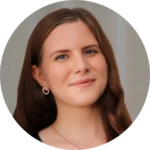 The journey into medical education isn’t always linear, but a passion for improving patient outcomes, combined with strong scientific knowledge and communication skills, provides a solid foundation for success. Zoe Taylor, Education Development Director at touchIME, has been part of the touchIME team for two years and is quickly establishing herself as a rising star in the world of independent medical education (IME). With a background spanning chemistry, pharmaceuticals and academic publishing, she brings a unique blend of scientific insight and editorial experience to her work.
The journey into medical education isn’t always linear, but a passion for improving patient outcomes, combined with strong scientific knowledge and communication skills, provides a solid foundation for success. Zoe Taylor, Education Development Director at touchIME, has been part of the touchIME team for two years and is quickly establishing herself as a rising star in the world of independent medical education (IME). With a background spanning chemistry, pharmaceuticals and academic publishing, she brings a unique blend of scientific insight and editorial experience to her work.
In this Q&A, Zoe shares how she made her way into the world of IME, what skills she finds essential and what excites her most about the future of medical education.
Q. Can you tell us a bit about your background and how you found your way into the IME/continuing medical education (CME) industry?
I wasn’t always sure what I wanted my career to look like, so I just followed my interests, and my passion for engaging education started early. Back in college, I set up a chemistry club to support students who found science challenging. It ended up winning an award from the Speaker of Parliament, which was a really proud moment and reinforced my drive to make learning accessible.
I studied chemistry at university, followed by a Master’s in analytical and forensic science. After that, I spent around 4 years working in the pharmaceutical industry at a contract development and manufacturing organisation (CDMO). I was an Analytical Development Team Leader, working on therapies in clinical trials, which gave me a strong foundation in understanding the evolving pharmaceutical (pharma) landscape. The role involved a lot of project management and liaising with top pharma clients, which is experience that’s proven really useful now that I’m managing multiple stakeholders in IME.
After that, I moved into publishing, spending a few years as a Commissioning Editor in scientific journals, including here at touch, before moving internally into the medical education team. I haven’t looked back since; I’ve really enjoyed growing into this role over the last couple of years.
Q. What skills do you think are essential for someone starting out in IME/CME today?
Everyone brings something different to the table and we have a variety of backgrounds on our team. But for me, my science background and time in pharma have been really helpful. They have given me the tools to research effectively, understand the industry and spot educational needs and emerging trends.
Networking is a big part of the role. I’ve been active in professional networks since university, where I served as president of the chemistry society. That experience helped me secure my first internship by connecting with local industry leaders. Being able to build and maintain those relationships is really important in IME.
But more than anything, I think you have to truly believe in what we’re doing. Everything we do is ultimately about improving patient care, and that belief underpins every conversation, every piece of research. If you’re driven by that same goal, I think you’ll find the work incredibly rewarding.
Q. How do you see your role evolving over the next few years?
Personally, my next goal is to become a senior Education Development Director (EDD), which is the natural next step for me. I’m still learning, and I’m really lucky to be surrounded by such an experienced and growing team. They help me develop every day, and I know they’ll continue to do so.
In terms of the role itself, the fundamentals will stay the same, but how we deliver education is always evolving. We’re constantly looking at how healthcare professionals prefer to learn, whether it’s shorter, bite-sized content or more interactive formats. Our patient cases format and the Learner-to-Patient Impact (LPI) outcomes model are examples of how we’re innovating right now.
We also can’t talk about the future without mentioning artificial intelligence (AI). It’s already changing how we work and how we deliver education. I don’t know yet exactly how big the impact will be, but it’s clearly going to be part of the picture going forward.
Q. What excites you most about the future of independent medical education?
The potential for innovation in medical education is incredibly exciting. There’s so much scope to transform how we deliver content and personalize learning for healthcare professionals. We’re already moving beyond Moore’s levels to measure impact, but I believe we’re only scratching the surface of what’s possible.
We’re also seeing more patient-centred education, which is so important. It’s not just about involving the patient perspective in determining educational needs – we’re designing content around the patient journey and hearing their stories.
More broadly, being part of healthcare at a time of such rapid progress is inspiring. The advances in treatment and care are incredible; patients today have access to groundbreaking therapies that weren’t available even a few years ago, and that access is only going to keep improving. Being able to play even a small role in this by educating healthcare professionals on these advancements, and ultimately improving patient outcomes, is incredibly inspiring.
Interested in discovering more about what we do? Reach out to learn about our educational activities, regular content and partnerships with medical societies.

